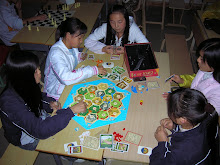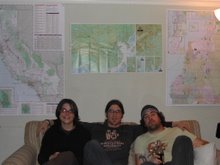Last week I was asked to prepare something for a radio broadcast throughout the campus. I misunderstood what they wanted and prepared a short discussion. As it turns out, the students wanted to interview me during the broadcast and provide a hot-line for students to call and ask me questions. This is what I wrote for them before I realized it was an interview:
Good afternoon. My name is Dustin Ooley. My Chinese name is 欧雷。 I came to China about one year ago as a Peace Corps Volunteer. I was in Chengdu for 2 months last year. While I was in Chengdu I lived with a Chinese family. I also studied Chinese for 5 or 6 hours every day. My training helped me to learn about Chinese culture and teaching English in China.
The school asked me to talk to you today about American Culture. This topic is too big for me, and I want to focus on two things: my cultural surprises when coming to China and my regional dialect (fangyan).
I had no idea history was so important to a people.
When students talk to me for the first time, I often hear the same questions. After answering these questions, people want to talk about their country’s history. People want to know what I know about the past. I was never interested in history, but now people were asking me about it. I quickly learned Chinese words and phrases such as “5,000 years of history,” and “Qing Dynasty, Tang Dynasty, Terra Cotta Warriors”. My feelings about the history have always been neutral, but I am amazed how many Chinese people have pride in their own history. Where one comes from is even important; to know your roots or laojia is critical. I know why this is important but I don’t really understand it very well. I am from a different kind of society. Our history is brief and few people talk about it regularly.
I expected to learn a lot about Chinese culture when I came to China. I thought that I would understand Chinese people. But the longer I am in China, the less I know. So many contradictions leave me feeling confused and lost. Eventually I realized that I was learning something else: I was becoming more of an expert on my own culture. Coming to China helped me to understand my culture and myself; I needed another culture to help me understand my own. This has been valuable as I try to explain my thoughts to my students. I have started to understand my own materialism and individualism. I have learned how these are aspects of my personality. I accept that I am very different from Chinese people, even after living in China for over a year. I will probably always be different.
When I first started teaching Chinese students I learned to talk slower and more clearly. My students still complain that I speak too quickly, but I try and speak slowly. In class I use more special English. I try not to use complicated grammar or complicated words. I try to be more like Voice of America: clear, slow, and standard. But America has many dialects. Despite my slower speech I still speak with an accent.
I am from a small town in the Northwest of America. My hometown has 20,000 people. I have a unique, regional fangyan. This is the dialect I speak with my family, and it’s different than other parts of America. My dialect is understood by all Americans because it is not like Guizhouhua and Putonghua. But there are still differences. Today I want to share some of the differences using common phrases.
One common phrase is “Where are you going?” In Mandarin this is “Ni qu nar?”, but dialect it is more like, “Ni kay na day?” The same is true with my dialect. “Where are you going?” is actually “Where yuh goin?”
Other phrases are a bit more interesting. “What is going on?” is less clear: “Skoe in on?”
“Do you know what I mean?” is “Yuh no whudeye mean?”
“What are you doing?” is actually “Whud ar yuh doo in.”
“You are going to the store?” is not quite so clear because the last word is the only one that’s the same: “Yer goin du thu store?”
“I do not know what you are talking about.” Is “I dunno whutcher tahkin uhbowt.”
Some of my students understand parts of my dialect. They can follow my lazy speech. But most cannot. Many become frustrated; they have learned British English for 6 years, and now they must learn American English! I feel the same frustration when I try to understand Guizhouhua.
10.15.2008
Subscribe to:
Post Comments (Atom)








No comments:
Post a Comment